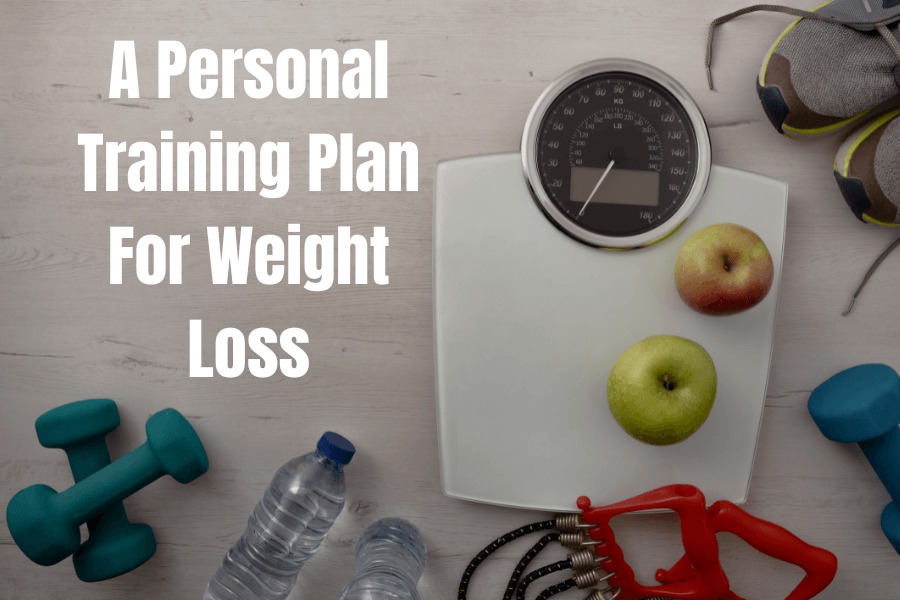Table of Contents
Weight loss is a journey, much like climbing a mountain. Reaching the summit can be challenging and rewarding, and personal training plans are one way to get there.
Achieving your best body yet requires dedication and determination, which these plans provide by breaking down goals into manageable segments.
This article will explore how personalised training plans can help your weight-loss journey.
Personalised training plans for weight loss typically involve creating individualised workout regimens tailored to meet specific needs or goals. These regimens usually focus on cardio workouts, strength-training exercises, nutrition guidance, and lifestyle planning.
This plan aims to establish healthy habits that will last long after the program ends to ensure lasting results from your hard work.
Meet Your Trainer: Introducing Our Personalised 4-Week Weight Loss Program
Weight loss is a goal that can be achieved with the proper guidance and support. Our 4-week workout plan for weight loss offers personalised advice to help individuals reach their target goals in a short amount of time.
This program includes both male and female options, providing tailored plans depending on gender and considering individual needs and preferences.
The plan consists of two weekly workouts focusing on burning fat and building muscle through strength training exercises with weights or bodyweight movements.
These carefully crafted routines are designed to maximise caloric burn while helping participants build lean muscle mass for definition throughout the four weeks.
Additionally, each exercise comes with detailed instructions and illustrations so members can feel confident performing them correctly.
Our 4-week workout plan for weight loss provides an easy-to-follow guide to reaching fitness goals quickly and safely, all from the comfort of home or the gym. The program’s comprehensive pdf outlines daily activities, including warm-up stretches, resistance training, cardio intervals, cool-down exercises, recommended nutrition tips, form checks and more – making tracking progress toward desired results simple.
Setting Realistic Goals: What Is A Healthy 4-Week Weight Loss Goal?
Setting realistic goals is the key to success when it comes to weight loss. Taking on a personalised four-week weight loss program can be daunting, but achieving these goals with the right tools and support becomes achievable.
Just like constructing a building requires a solid foundation, creating healthy habits for long-term weight loss begins with understanding what constitutes a reasonable goal in four weeks.
Picture this: You’re standing atop two mountains—each representing one week of your journey towards healthier living. Looking down at each peak reveals that you are well prepared for both physical and mental challenges along the way; by utilising a free gym workout plan for weight loss, you have the necessary supplies to build stamina and strength as you make progress throughout the month.
It may seem intimidating initially, but taking small daily steps will lead to significant changes over time. Achieving sustainable results takes dedication and patience; setting weekly milestones motivates while increasing self-confidence as successes accumulate during the four weeks.
With determination and commitment to making positive lifestyle choices today, there’s no limit to how far your body can go!
The Essentials Of Weight Loss: Calories In Vs. Calories Out, Protein, Fat, And Carbs
Weight loss is an often-discussed topic, and understanding the fundamentals of it is critical to reducing body fat. Calories In vs Calories Out, Protein, Fat, and Carbs are some of the essential components that need to be considered when creating a weight loss plan.
Calorie control – or energy balance – is one of the most important aspects of any tailored weight loss plan. To lose weight, you must consume fewer calories than your body needs for maintenance; this can be done by eating fewer snacks and meals with less calorie-dense foods such as fruits and vegetables while increasing physical activity levels.
The energy (calories) needed will vary depending on age, gender, height and current weight. However, having a rough idea of these numbers helps ensure success in achieving weight loss goals.
Nutrition significantly affects overall health outcomes, including successful weight management. Eating adequate amounts of protein, including lean meats like chicken breast and seafood, helps maintain muscle mass while decreasing appetite cravings due to its satiating effects[1].
Quality fats from sources like avocados, olive oil and nuts provide essential fatty acids and promote feelings of fullness after meals[2]. Lastly, carbs should come from nutrient-dense sources such as whole grains, sweet potatoes, quinoa or oats rather than processed ones like white bread or pastries[3].
When aiming for optimal performance, a balanced approach to nutrition has been shown to yield better results rather than focusing solely on cutting out entire food groups [4].
In summary, controlling caloric intake and eating enough quality proteins & fats while consuming complex carbohydrates are all fundamental elements necessary to achieve effective long-term weight management results.
[1] Acheson et al., 2004
[2] Martins et al., 2009
[3] Kreider RB et al., 2010
[4] Dietary Guidelines Advisory Committee 2015
Building Your Own Weight-Loss Workout Plan: Cardio, Strength, And More
Understanding the essentials of weight loss, such as calories in vs calories out, protein, fat, and carbs, is essential for formulating a successful personal training plan to unlock one’s best body.
Building upon this foundational knowledge, it is important to consider key elements when creating an effective workout plan, such as cardio, strength exercises, and more.
When constructing a personalised weight-loss workout plan tailored specifically to individual needs and goals, it is essential to include both aerobic activity – typically referred to as “cardio” – and resistance training – which includes activities such as lifting weights or using exercise bands.
Cardiovascular activities are beneficial because they burn many calories during the activity itself by increasing heart rate and respiration over an extended period, contributing significantly to overall caloric expenditure.
Resistance training can also be instrumental in helping people reach their fitness goals because these types of workouts help build muscle mass while simultaneously burning excess fat.
Increasing muscle mass helps reduce body fat since muscles require more energy than fat, even at rest.
To achieve the desired outcome from any physical fitness program – whether that goal is related to building muscle or losing weight – it is necessary to create a personalised routine composed of various forms of exercise, including cardio and strength exercises.
It is also important to remember that consistency with workouts over time will produce results faster than sporadic bursts of physical activity occasionally.
Incorporating regular exercise into an individual’s lifestyle supports health-related objectives and may increase feelings of well-being through increased endorphins released during physical exertion.
Your Weekly Weight Loss Workout Plan: A Comprehensive Fitness Guide
The journey to a healthier body can be arduous, and the path from point A to point B is not necessarily easy. But like any great accomplishment, it requires dedication and determination; strive for greatness on your weight loss adventure, and you will unlock your best version of yourself.
A comprehensive fitness plan for weekly weight loss is necessary for success:
Healthy eating habits must be established.
Regular exercise should become part of your daily routine.
Motivation levels need to remain high if progress is going to be made.
Take stock of where you are currently physically and mentally. This baseline assessment will provide invaluable data as you move forward with training plans tailored to meet each individual’s needs.
To maximise results while minimising injury risk, a combination of strength-based exercises and aerobic activities such as running or cycling should be included in your program. Proper form is vital when performing resistance-training movements, so seek advice from professionals whenever possible – even minor adjustments can make a world of difference when it comes to achieving desired outcomes.
Considering these factors, nothing is stopping you from getting the most out of your workouts!
More Than Just Weights And Cardio: A Holistic Approach To Weight Loss
A holistic approach to weight loss not only focuses on physical wellness and exercise but also considers the role of mental health in achieving success.
This comprehensive model for weight management emphasises lifestyle changes such as healthy eating habits, regular sleep patterns, and stress reduction techniques. Furthermore, a holistic plan should include an individualised assessment of each person’s unique challenges that could prevent them from reaching their goals.
For instance, incorporating mindful practices like meditation or yoga into their daily routine can help individuals manage anxiety levels and find balance in their lives. Additionally, engaging in meaningful activities with friends and family can provide motivation and support during difficult times.
These social connections are essential for promoting a positive self-image, which can lead to healthier decision-making regarding dieting choices. Moreover, developing consistent meal planning and preparation routines can help reduce reliance on processed foods while building discipline towards long-term goals.
It is clear that successful weight loss requires more than just controlling caloric intake and exercising regularly; it involves understanding how all aspects of life interact with each other to create lasting change. Achieving progress through this approach will take patience and dedication but ultimately lead to greater satisfaction and improved overall well-being.
Maximising Your Workouts: Strength Training, Cardio, And Conditioning
Working out with a personal trainer is an excellent way to improve overall health and fitness. Strength training, cardio conditioning, and other forms of physical activity should be incorporated into the exercise plan for those looking to lose weight.
Incorporating these three types of exercises into your workout routine can provide numerous benefits:
- Strength training helps build muscle mass, increasing metabolism and allowing for more efficient fat burning during workouts.
- Cardio conditioning boosts heart rate and endurance levels by increasing circulation throughout the body.
- Conditioning exercises target specific areas such as the arms, abs or legs to tone up muscles and burn excess calories faster.
Properly incorporating strength training, cardio conditioning and conditioning exercises into a personalised exercise plan will help individuals reach their desired level of fitness while assisting them to meet their weight loss goals safely and effectively.
4 Week Workout Plan For Weight Loss: Build Muscle And Lose Fat
Strength training, cardio and conditioning are essential components of any weight-loss program. Studies have shown that strength training can help build lean muscle mass while burning fat, which helps with long-term results.
Cardio is also effective for increasing calorie burn to promote weight loss. Finally, conditioning exercises such as Pilates and yoga can improve posture, balance and flexibility – all critical factors in achieving optimal fitness.
A successful weekly workout plan for weight loss should combine these three elements. Strength training sessions could include free weights or machines at the gym focusing on different body parts each day, along with plyometric exercises like squats and lunges.
For cardiovascular exercise, interval training or high-intensity workouts like spinning classes will help burn more calories quickly. In addition, regular stretching and low-impact movement, such as walking or jogging, can provide vital benefits without putting too much strain on the joints.
Creating a personalised schedule with adequate rest days is vital to success when trying to lose weight through exercise. Aiming for four to five thirty-minute workouts per week combined with one longer session over the weekend will ensure enough time for recovery between sessions.
Eating a balanced diet filled with nutritious foods from all food groups, plus drinking plenty of water, will maximise results from this weekly plan.
Encouraging Your Clients To Stay Fit 24/7: Tips For Personal Trainers
Personal trainers have an important role in motivating and encouraging their clients to stay fit 24/7. Successful personal trainers must be able to inspire and motivate their clients to continue the exercise plan outside of their scheduled training sessions, no matter what obstacles they may face.
Creating a positive atmosphere during each session is essential for helping clients reach their goals. This can foster enthusiasm and determination that will carry over into other aspects of life. Additionally, providing them with support and feedback on progress can help ensure they remain committed to achieving results.
Setting achievable short-term goals can benefit many clients when it comes to staying motivated outside of training sessions. This allows them to track their progress easily while providing a sense of accomplishment when achieving those goals.
Educating clients about nutrition and healthy habits can also play an essential role in weight loss plans, allowing them to understand better how diet plays into overall health and fitness levels.
Customising Your Weight-Loss Workout Plan For Clients: Focus On Their Trouble Spots
When creating a customised weight-loss workout plan for clients, it is essential to identify their trouble spots. This can be done by assessing the client’s current physical condition and discussing with them what areas they would like to focus on.
During the initial consultation, questions should include inquiring about health conditions or injuries affecting exercise selection and intensity. Once these factors are identified, the trainer can create a personalised program tailored to the individual’s needs and preferences.
The program should take into account both cardiovascular endurance goals as well as strength training exercises designed to target specific muscle groups. Given the client’s fitness level and medical history, high-intensity interval training (HIIT) may also be beneficial.
Achieving desired results requires consistently following a structured program of exercise, diet and lifestyle modifications over time. To maintain motivation throughout this process, trainers should motivate clients with positive reinforcement while providing feedback on progress made along the way.
Regularly monitoring body composition changes will help ensure that goals are met effectively and efficiently.
Beyond Sweat: Exercising And Staying Motivated Long-Term
Exercising is crucial to any weight loss plan, and staying motivated to continue exercising can be a challenge. To ensure you remain consistent with your workout routine, here are several tips to keep in mind:
- Establish realistic goals – setting achievable objectives allows for better progress tracking and helps to reduce frustration when trying to stay on track.
- Make it enjoyable – finding activities or workouts that are fun and engaging will help maintain motivation levels over time.
- Reward yourself – incentives such as rewards after completing certain milestones help reinforce the positive behaviour associated with healthy habits.
It is important to remember that everyone’s journey is different, so what works for others may not work for you. Being mindful of your own needs and preferences will make it easier to find an exercise program that suits you best and keeps you engaged long-term.
Additionally, reaching out for support from friends or family members could provide additional encouragement during difficult times; having someone available who understands what you’re going through can make all the difference in achieving success with your fitness goals.
What’s Next? What To Do After You Finish The 4-Week Program
Completing a four-week program of personal training plans for weight loss is like reaching the summit of your mountain. You have put in countless hours and effort to achieve this goal, and you should be proud of yourself for all that hard work! Now that you’ve arrived at the top, it’s time to decide what comes next.
| Activity | Benefits |
|---|---|
| Stretching | Improves flexibility & range of motion |
| Weight Training | Increases metabolism & muscle mass |
| Cardio | Strengthens heart & lungs |
| Balance Exercises | Enhances coordination & stability |
| Core Workouts | Tones abdominal muscles |
Taking on new activities or continuing with existing ones can help keep motivation high and prevent burnout by providing variety and tangible progress towards goals.
Consider stretching, weight training, cardio exercises, balance drills and core workouts to stay active and healthy after completing the program.
Each activity has its unique benefits outlined in the table above. For example, stretching helps improve flexibility, while weight training increases metabolism and builds muscle mass.
Staying motivated long-term requires setting achievable goals and celebrating successes along the way. Celebrating incremental achievements will provide positive reinforcement so each step forward feels rewarding rather than overwhelming. Achieving success doesn’t stop when one reaches their initial goal – it just serves as the starting point for more ambitious goals!
Diverse Workout Ideas For Weight Loss: From Boxing To Yoga And Everything In Between
Weight loss is a fundamental goal for many individuals, and physical activity can play a significant role. To ensure success, it is essential to have access to various exercises tailored to personal goals and abilities.
From boxing classes to yoga sessions, diverse workout ideas are available to help target specific fitness needs.
High-intensity interval training (HIIT) workouts involve quick bursts of intense exercise followed by short recovery periods, ideal for those looking to build strength or lose weight quickly.
Weightlifting routines are also beneficial, improving muscle tone and endurance while boosting metabolism.
Pilates combines flexibility movements with deep breathing techniques for those seeking a more relaxed approach, helping promote relaxation and mental well-being alongside physical exercise.
Yoga offers another option for those looking for low-impact but effective forms of exercise; its combination of mindfulness meditation and postures helps strengthen the core muscles while improving balance and stability.
Swimming is another excellent alternative that builds cardiovascular health while providing relief from any impact on joints or bones common with other types of high-intensity activities.
Whatever individuals’ preferences, incorporating these options into their routines will help them reach their desired results safely and effectively.
Supplementing Your Success: Should You Take Any Dietary Supplements For Weight Loss?
The promise of fast and easy weight loss can be alluring, but the reality is often much slower and more complex. To unlock your best body yet, it’s essential to consider all available options – including dietary supplements. While a variety of products on offer could boost your efforts in achieving your desired results, they should never precede proper nutrition and exercise habits.
From sports drinks to protein powders, from vitamins to fat burners – the choices are seemingly endless when considering supplementation for weight loss. There’s no denying that these products have potential benefits for those seeking to maximise their success; however, it’s crucial not to rely solely on them as part of any health or fitness program.
Utilising such additions must always come with caution and moderation since none will replace healthy lifestyle habits like regular physical activity and nutritious foods.
It’s also essential to remember that many dietary supplements may contain additional ingredients which do not appear on labels – even if claims suggest otherwise. Therefore, doing thorough research into each product before purchase is recommended not to compromise overall health goals while attempting to reach them faster through outside sources.
Whether you decide supplementing is right for you or not, putting care and thought into every decision regarding diet and exercise will help ensure long-term success.
Frequently Asked Questions
How Much Weight Can I Expect To Lose In 4 Weeks?
Weight loss is a common goal among many individuals, and establishing an effective plan can be beneficial.
Research has found that weight loss in four weeks may vary depending on the person’s starting body weight, lifestyle habits, and exercise routine.
It is estimated that those with a higher starting body weight or are more sedentary may lose up to five pounds over this time frame, whereas people with lower initial body weights may only lose one to three pounds.
Additionally, following a diet high in protein and low in carbohydrates, alongside engaging in regular physical activity, can influence how much weight is lost each week.
What Is The Best Way To Measure Progress Towards My Weight Loss Goals?
Recent studies have shown that, on average, individuals actively pursuing a weight loss goal typically lose between 4-7% of their body fat in one month.
When measuring progress towards such a goal, the best option is to utilise body measurements and/or photos over traditional scales, as they can offer a more accurate representation of changes occurring in your physique.
Additionally, taking note of other factors such as energy levels, mood swings, and overall satisfaction with results achieved from workouts can also be beneficial when monitoring how close you are to reaching your fitness goals.
Are There Any Risks Associated With The 4-Week Program?
‘Are there any risks associated with the 4-week program?’ is a valid question when embarking upon physical weight-loss training plans.
It is essential to be aware of the potential risks associated with such programs to ensure appropriate safety measures are taken.
Potential risks may include muscle strain from overtraining or excessive fatigue due to inadequate rest and recovery time between workouts.
Consultation with medical professionals can help identify other potential health risks specific to an individual’s situation before starting a new physical training plan.
What Type Of Diet Should I Be Following While Doing The Program?
The type of diet that should be followed while engaging in a four-week program will depend on the individual’s goals, lifestyle and health.
A comprehensive approach is often best for achieving sustainable weight loss, which includes incorporating nutritious whole foods, eating balanced meals throughout the day and limiting processed foods.
Additionally, individuals may need to adjust their daily calorie intake based on activity level and other factors.
Individuals need to consult with a nutritionist or healthcare provider before beginning any dietary changes as part of an overall plan to reach fitness goals.
What Type Of Activity Should I Do In Addition To The Program To Maximise My Results?
Engaging in physical activity is essential to maximise the results of a personal training plan for weight loss.
Taking on additional activities such as running, swimming, cycling or strength training can provide an added boost and help reach desired goals faster.
As with any exercise routine, consistency is vital; set realistic expectations and challenge yourself daily.
It’s also important to remember that incorporating an adequate diet into the program will further enhance progress towards unlocking your best body yet – so remember to fuel up!
Conclusion
Research indicates that individuals who incorporate a personal training program into their weekly routine can expect to lose up to 10 pounds in 4 weeks.
This statistic demonstrates the effectiveness of such an approach, as it provides tangible results in a relatively short time frame.
Moreover, with proper dieting and additional activity incorporated alongside the program, further weight loss goals can be achieved more quickly and efficiently than without this structured plan.
In conclusion, unlocking your best body is possible through implementing a personal training program for weight loss.











